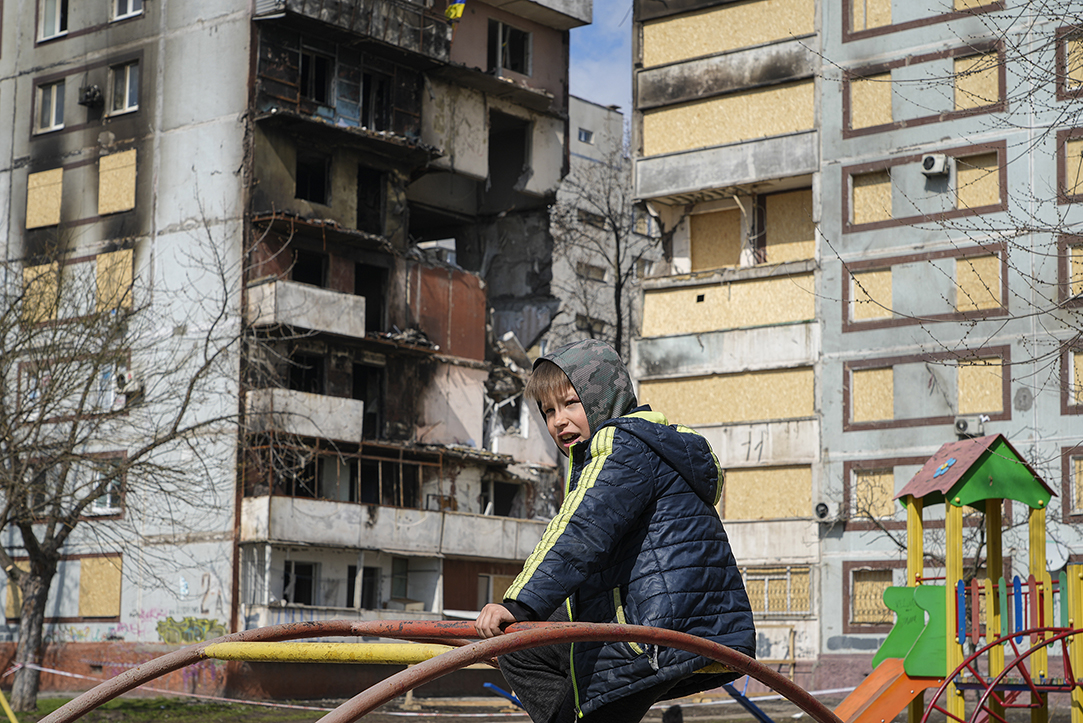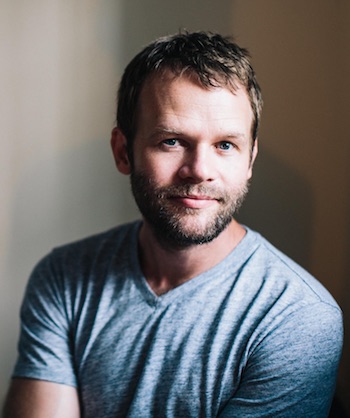
A boy sits on a climbing frame in a playground in Ukraine in March 2023. (AP Photo/Efrem Lukatsky)
Children are particularly vulnerable to armed conflict in urban settings and face distinct risks that can affect their health, safety, and development.
That is the key takeaway from a new report drafted by a part-time faculty member in the Boston College School of Social Work and published by the International Committee of the Red Cross, a humanitarian organization based in Switzerland.
“Urban warfare affects children in all ways imaginable and requires a totalizing response,” said Timothy Williams, who has been teaching Global Child Protection at BCSSW for eight years. “That entails the coordination of everyone from weapons bearers to humanitarian agencies and to governments as well.”
Williams played a major role in producing the report, presented Monday in Norway at an international conference dedicated to protecting children in armed conflict. He conducted a literature review, interviewed 50 experts in Yemen, Syria, Ukraine, and Gaza, including nurses, trauma surgeons, and education specialists, and then wrote the first draft of the report as Russia was launching a military invasion of Ukraine in February 2022.
“The crisis in Ukraine confirmed what we were actually writing in real time was aligned with the realities facing children on the ground,” said Williams, whose scholarship focuses on the well-being of children. “But it’s also a reminder that there’s multiple conflicts happening in which urban warfare is affecting children. And while Ukraine is the most visible, it’s not the only one.”
Childhood in Rubble: The Humanitarian Consequences of Urban Warfare for Children details more than a dozen ways armed conflict in urban areas specifically affects the lives of children, one in six of whom must navigate war as part of their daily existence. The report, the first of its kind, shows that urban warfare can profoundly impact their mental health, disrupt their education, and place them in proximity to combatants who could forcibly recruit them to their armed groups.
‘Toxic’ stress caused by witnessing or experiencing violence can rewire the architecture of children’s developing brains, the report said, with lifelong consequences for their health and well-being. Children are often too traumatized by ongoing bombing and shelling to attend to their school work, according to the report. And older children, made to believe that they are protecting their families, can be coerced to join a conflict and risk exposure to additional harm.

Timothy Williams.
Williams, MSW’06, said that children’s anatomy and physiology make them particularly vulnerable to the effects of explosive devices. Children generally weigh less than adults, he said, making them more susceptible to the force of an unexpected blast. Their bodies contain less blood, so they can’t afford to lose as much. The destruction of essential services, including water, sanitation, and healthcare, can lead to outbreaks of infectious disease, he said, and increase the likelihood that children will starve or even die. And their unpredictable patterns of movement—think of kids running down a street to fetch water for their families—put them at extreme risk of being in the wrong place at the wrong time.
“Urban warfare is often looked at through the lens of education or health or even water and sanitation. Sometimes, we look at children through the lens of issues such as gender, disability, or the proximity to explosive weapons,” said Williams, whose research includes a decade-long investigation into education policy in Rwanda. “While all of those factors are extremely important, this report brings all of that together to think about how those different aspects of children’s lives can be understood more in totality to give a broader picture about the way that urban warfare shapes their well-being.”
The report includes a vignette from a young woman from Yemen named Marwa, who shared her unique experience of urban warfare at a conference at the United Nations headquarters last year. Marwa, who was 11 years old when civil war erupted in Yemen in 2014, recalled bombs exploding outside her home, kids being shot on their way to market, and the fear of accidentally stepping on a well-hidden landmine.
“Personally, I prefer to watch out for snipers. At least the sniper might see I am only a girl and decide not to shoot,” she is quoted as saying in the report. “Nothing can save you from an air strike. The missile can kill you and all your family members while asleep at home, and there’s nothing you can do to avoid dying under the rubble of your own home.”
Childhood in Rubble makes concrete recommendations for states, combatants, and humanitarian organizations to curb the deleterious effects of urban warfare on children, saying each group has the potential to protect youth in armed conflict and respond more effectively to their needs.
For example, the report recommends states identify shelters to use if needed and adapt them for children’s use. Commanders, the report said, should ensure that all those under their authority fully understand their intention to protect civilians and continually remind all subordinates of their obligations to prevent and reduce civilian harm. Humanitarian organizations, according to the report, should map the location of displaced children and patterns of children’s movement in and around given cities.
“The report aligns its recommendations based on international humanitarian law and various conventions that states have signed on to,” said Williams. “But it’s also really trying to be realistic in what it can recommend. Because this is such a holistic report, it really does talk about recommendations around health and education and things like that that I think need to be considered.”

